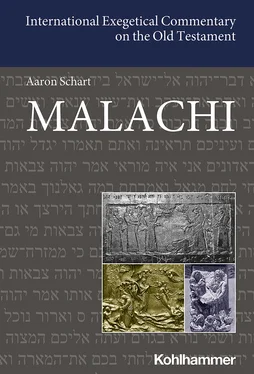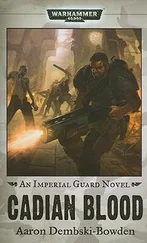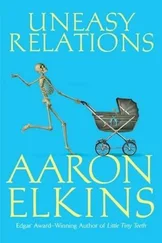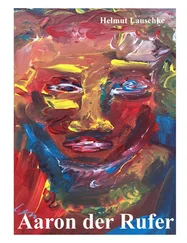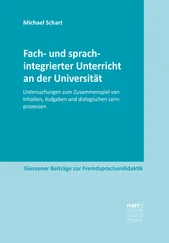Malachi’s opponents The Malachi document shows the prophet involved in disputes with various groups he directly addresses with “you say…,” even supposedly quoting them. If we assume the historical plausibility of the substantial core of the citations we can distinguish various groups. Jon Berquist finds three: the “inner-group,” representing what Malachi depicts as strict believers; an undecided “in-group”; and the “out-group,” which includes the evildoers. 39But that is only a reconstruction of the personal view of the prophet. We have to set alongside it a description of the groups from an external historical perspective. A good starting point would be to describe the relationship between the various groups and the temple cult.
Priests At the center of the social fabric stood the temple in Jerusalem. Regrettably, we know little about the temple district and the organization of its personnel in the Persian period. It appears from the Malachi document that there was a “table” for vegetable gifts and an “altar” for animal sacrifices. There was also a storehouse in which the offerings, especially the tithes, were kept (Mal 3:10a). Supervision of the sacrifices lay with the priests. This included the communication of cultic decisions to the laity. They would also have been responsible for the collection and distribution of the tithes and other offerings. 40
Levites Besides the priests, the Malachi document also mentions Levites (Mal 2:4b, 8b; 3:3). It is disputed whether priests and Levites made up two distinct groups or whether the priests were a sub-group of the Levites. The latter is most probable. That offers the best explanation of why the priests were criticized (Mal 1:6; 2:1) while their present wrong behavior is contrasted with their obligation on the basis of the covenant with Levi (Mal 2:4b, 8b). The idea of a “covenant with Levi” appears only in this passage. It most probably results from a broad interpretation of Num 25:12, where Phinehas is offered a covenant of peace because his deed has protected Israel from Yhwh’s wrath; the covenant with Phinehas is extended to the Levites as a whole. The priests, as successors to Phinehas, thus constitute the core of the Levites. In addition the prophet expects that a future purification of the Levites will result in a renewed presentation of gifts (Mal 3:3–4); here the priests are not mentioned separately, although—at the same time—they have been addressed as the principal offenders (Mal 1:6; 2:1).
Participants in the cult Besides the cultic personnel there is mention of laypersons who take an active part in cultic activities out of subjective conviction. Still, the prophet accuses them of insulting Yhwh. It appears that the cultic participants addressed here are withholding property they ought to contribute to the temple. For example, they present blemished animals for sacrifice (Mal 1:8a). The prophet characterizes the sacrificial practice of this group as “wicked” (Mal 1:8a; NRSV: “wrong”). If we speculate about how those criticized might have justified themselves, we may suppose they would have pointed out that for Yhwh it is not the material of the sacrifice that determines its acceptance, but rather the internal attitude with which it is offered. Moreover, the word “weariness” (1:13) allows us to suppose that the participants in the cult were in a difficult economic situation and could have sold the animals elsewhere for a profit (cf. Mal 3:14). If, on the other hand, the neglect of the cult took place without any economic excuse we could suppose it most likely that what is being criticized is the group’s own self-distancing from animal sacrifices, perhaps in favor of different cultic actions.
The Separated We can call the third group the “separated.” They have distanced themselves from temple worship. The point of the distancing may have been the question whether Yhwh is the guarantor and protector of what is right (Mal 2:17). The separated ones measure Yhwh’s potency by the implementation of right and by economic success and thus arrive at the conviction that there is no point in continuing the pious practices of the past toward Yhwh. Instead, success belongs to those who are profit-oriented in their thinking and their living (Mal 3:15).
The Uncertain In Mal 1:2 we might discern yet a fourth group we could call “the uncertain.” They assent to faith principles about Yhwh’s love for the people that can be derived—more or less—from tradition, but they are unsure whether and how that affects their own lives.
The prophet’s supporters The group that stands behind the prophet relies on tradition, especially the Torah. It makes high demands regarding the purity of the sacrificial animals like those found also in Leviticus. On the other hand, the second disputation speech mentions neither the burnt offerings nor the penitential rituals involving blood, which constitute the core of cultic practice in Leviticus (Lev 4:20, 26, 31, 35; 5:10, 13, 16, 18; 19:22; Num 15:25–28).
The Nations A redactor has inserted an unusually positive statement about the nations (Mal 1:11, 14): they bring a “pure offering” and acknowledge Yhwh’s “greatness.” Historically speaking we can see positive experiences with the Persians behind these statements. That there are also declared enemies of Yhwh among the nations is just, as clearly stated when God sharply separates Esau/Edom out of “hatred” for “him” (Mal 1:3). The basic stratum makes it clear that Edom will be destroyed by Yhwh while Jacob may expect Yhwh’s love and care because he carries out the worship that is appropriate for God.
Ideas about God in the Malachi Document
The prophet seeks to base his arguments on ideas about God that he presumes his opponents share. We may list these in brief form:
– The Malachi document begins with Yhwh’s declaration of love for the descendants of Jacob. Given its positioning at the very beginning, the self-revealing utterance “I have loved you!” must certainly be seen as the basic statement of the Malachi document (Mal 1:2). However, it is accompanied by the saying that Yhwh hates Esau.
– Yhwh is compared to a “father,” that is, a family patriarch to whom every member of the family naturally shows respect (Mal 1:6a).
– Yhwh expects that appropriate gifts will be brought to him at the temple in Jerusalem (Mal 1:7–8). Worship at the temple must always have the highest priority in the life of the family.
– God is “great” among the nations, and the nations are in a position to acknowledge God’s greatness (Mal 1:11, 14b). In fact, the nations offer “pure gifts to Yhwh” (Mal 1:11a).
– Yhwh keeps watch over what is right and is personally responsible for the so-called personae miserae (Mal 3:5).
– Yhwh keeps an archive or “book of remembrance” (Mal 3:16) in order to be certain that at the judgment on the day of Yhwh there will be no dearth of information about those to be judged, so that every action and gesture of respect before God may be truly rewarded.
– Yhwh also rules over Nature and therefore end a drought by opening the sluices of the heavens (Mal 3:10–12).
– Over time, Yhwh’s nature does not change (Mal 3:6). Thus, one may feel secure in knowing that God’s faithfulness is perpetual.
– God’s righteousness may be in dispute at present, but the day of Yhwh will make that righteousness fully visible (Mal 3:18). The redactors have solidified the eschatological perspective on the future through allusions to Joel’s description of the coming day of Yhwh (Mal 3:2a, 19a, 23 [3:2a; 4:1a, 5]). The prophet points to the day of Yhwh in cases where he is unable to give an adequate answer to doubts about Yhwh’s present effectiveness. It is remarkable that the coming of the day of Yhwh is assigned a “messenger” as precursor (Mal 3:1a). At the end of the writing that messenger seems to be identified with Elijah (Mal 3:23 [4:5 ET]).
Читать дальше
